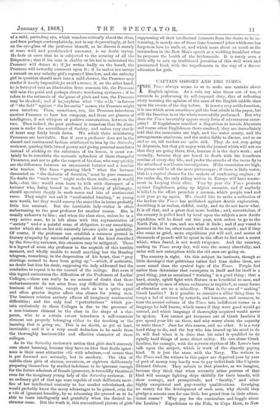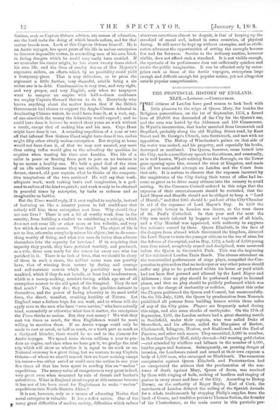CAPTAIN OSBORN AND THE TIAIES. T HE Times always seems to
us to make one mistake about English opinion. As a rule, say nine times out of ten, it succeeds in performing its self-imposed duty, that of reflecting every morning the opinion of the mass of the English middle class upon the events of the day before. It is not a very noble function, it is one which must sometimes gall the best minds in the paper, but still the function is on the whole successfully performed. But why does the Times invariably oppose every form of adventurous enter- prise? If Englishmen manifest a disposition to invade Abyssinia and rescue other Englishmen there confined, they are immediately told that the mountains are high, and the water scanty, and the arrangements cumbrous, and the mules liable to disease, and so on and so on, till readers are quite sick. They do not stop going to Abyssinia, but they get angry with the journal which will not see that they are going there, first, because it is the day's work ; and secondly, because they are bored to death with the humdrum routine of every-day life, and prefer the attacks of the tsetze fly to the attacks of workhouse investigators. If the mountains are high, the passes will be all the more picturesque ; if there is little water, that is a capital chance for the makers of ecrudensiug engines ; if the mules die, the only riding nation in Europe will have amuse- ment in keeping them alive. Year by year the Times protests against Englishmen going up Alpine summits, and if anybody is killed in the effort preaches a sermon, which people read and next year go up again. We should like to make a collection of the leaders the Times has published against Arctic exploration, describing it as useless, riskful, costly, and we do not know what. It is all that, and a great deal more besides ; and, nevertheless, if the country is polled head by head upon the subject a new Arctic expedition will be fitted out this year, with orders to go to the North Pole, if it can, and see what it finds ; and if any vessel is jammed in the ice, other vessels will be sent in search ; and if they also come to grief, more expeditions yet will sail, and scores of thousands of pounds will be spent in the effort to find out a secret which, when found, is not worth twopence. And the country, reading its Tines every day, will vote the money cheerfully, and order still new enterprises while the old ones are going on.
The country is right. On this subject its instincts, though so little developed that politicians rather feel than define them, are more sound than the cynical logic of the Times. People feel rather than determine that enterprise in itself and for itself is a good thing, just as occasional " training " is a good thing ; that a hard, steady, uphill fight with Nature is as beneficial to men, and particularly to men of whom endurance is required, as many forms of education are to a schoolboy. What is the use of " making" Greek Iambics ? Is it possible to conceive a sillier thing than to tempt a lad of sixteen by rewards, and honours, and menaces, to turn the second column of the Times into indifferent verses in a language he half knows, which verses if they were good would go unread, and which language if thoroughly acquired would never be spoken. You cannot get twopence out of Greek Iambics if you spend your life on them, and why worry about the capacity to write them? Just for this reason, and no other. It is a very hard thing to do, and the boy who has braced up his mind to do it, will find when it is done that his mind is qualified to do equally hard things of more direct utility. He can abuse Greek Iambics, for example, with the nervous rhythm of Mr. Lowe's best talk upon the subject, which is work of the directly paying kind. It is just the same with the Navy. The writers in the Times and the writers in this paper are deprived year by year of part of money very hardly won to pay individuals like Captain Sherard Osborn. They submit to that plunder, as we imagine, because they think that when necessity arises persons of that kind will manage fighting ships skilfully for their benefit, will show courage, and promptitude, and " faculty," and other highly exceptional and pay-worthy qualifications. Grudging no money for the development of such men, why should they grudge a minute sum for one little but grand item in their educa- tional course ? Why pay for the curriculum and boggle about the Iambics ? Expeditions to the Pole, to Cape Horn, to New Guinea, such as Captain Osborn advises, are means of education, are the hard tasks the doing of which breeds sailors, and for that matter breeds men. Look at this Captain Osborn himself. He is au Arctic voyager, has spent years of his life in useless enterprises to discover impossible routes, in controlling men of his own kind, in facing dangers which he could very easily have avoided. If we remember his career aright, he has about twenty times risked his own life, and the lives of sundry dozens of Her Majesty's expensive sailors, on efforts which by no possibility could yield a fourpenny-piece. That is very ridiculous, or to press the argument a little further, very shameful, suicide being a sin unless one is iu debt. Condemnation is very true, and very right, and very proper, and very English, only when we taxpayers want to conquer an empire with half-a-dozen cockboats we employ Captain Sherard Osborn to do it. Everybody who knows anything about the matter knows that if the British Government had chosen to support the Anglo-Chinese Admiral in dominating Chinese waters, he could have done it, at a cost, say, of one-ninetieth the money the Admiralty would expend ; and he could have done it because he wasted those years on work without a result, except that of making him and his men. Cape Horn might have done it too. A sounding expedition of a year or two off that infernal New Guinea Coast might have done it too, and so might fifty other utterly useless enterprises. But staying at home would not have done it, of that we may rest assured, any more than eating toffee would give to the schoolboy the qualities he Acquires when wasting his time over Iambics. The life of a sailor in peace or floating from port to port on no business is by no means a healthy one. We befr a good deal of the vices of an idle soldiery because they are visible, but just ask some decent, shrewd, old post captain what he thinks of the compara- tive temptations of the two services P He will say that work, adequate work, work tasking brain and imagination, is a god- send to sailors of the kind required ; and work is only to be obtained in peaceful times by enterprise, by tasks as arduous and as imaginatiVe as battles.
But the Times would reply, if it ever replied to anybody, instead of lecturing on like a country parson in full confidence that nobody will hiss, these enterprises cost lives. Why should they not cost lives ? There is not a bit of worthy work done in the country, from building a viaduct to establishing a college, which does not cost some life or other more or less valuable, and very few which do not cost scores. What then? The object of life is not to live, otherwise everybody misses his object ; but to do some- thing worthy of living, and what can men do better than educate themselves into the capacity for heroism ? If in acquiring that capacity they perish, they have perished worthily, and produced, as a rule, three men ready for the career for every one who has perished in it. There is no lack of lives, that we should be chary of them in such a cause, the noblest cause man can possibly have, that of winning from nature by daring and courage and self-restraint secrets which by possibility may benefit mankind, which if they do not benefit, at least lead to adventures, which in a money-seeking, comfort-loving, selfish age are of all enterprises nearest to the old quest of the Sangreal. They do not find much ? Yes, they do ; they find the qualities dormant in themselves, and the power of facing adversity in its most awful form, the direct, manifest, crushing hostility of Nature. Let England want a forlorn hope for sea work, and to whom will she apply save to the men who have "seen service," who have actually tried, successfully or otherwise what does it matter, the enterprises the Times thinks so useless. But they cost money? We wish they cost ten times as much, for then Englishmen would be more willing to sanction them. If an Arctic voyage could only be made to cost as much, or half as much, or a tenth part as much as a dockyard blunder, there would be no end to the clamour for Arctic voyages. We spend some eleven millions a year to pro- duce an engine, and then when we have got it, we grudge the trial trip which will show us whether it is equal to its work or no. National economy is a great thing, but we venture to say Captain Osborn—of whom we should remark that we know nothing except his career—has either saved or could save the nation in one year five times all that has been spent in sending him on " useless " expeditions. The money value of competence is very great indeed, very great even when measured by rule of thumb and banker's calculation. What is England about to pay at this moment because it has not of late been usual for Englishmen to make " useless" expeditions into North-Eastern Africa ?
It is not, however, only as a means of educating Navies that naval enterprise is valuable. It has a reflex action. One of the s, many great difficulties of modern society, difficulties which reduce
observers sometimes almost to despair, is that of keeping up the standard of moral and, indeed in some countries, of physical daring. It will never be kept up without examples, and as civili- zation advances the opportunities of setting the example become few and far between. Service in the ordinary routine, however visible, does not afford such a standard. It is not visible enough, the spectacle of its performance does not suffiCiently quicken and excite the public imagination. It can be afforded only by enter- prises such as those of the Arctic voyagers, enterprises large enough and difficult enough for popular notice, yet not altogether outside popular comprehension.









































 Previous page
Previous page